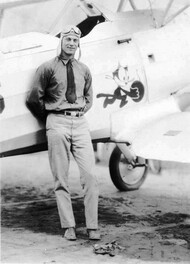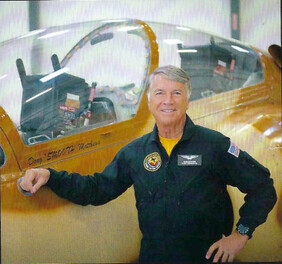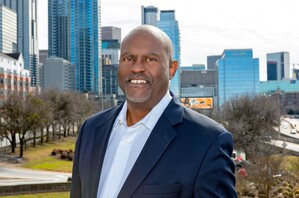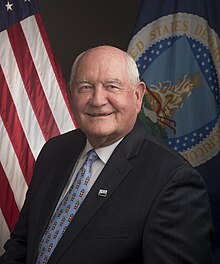2025 GAAHOF Inductees
Meet the 2025 GAAHOF Inductees
Charles Herbert Dolson

Charles “Charlie” Herbert Dolson, born May 13, 1906, in St. Louis, MO. had a pioneering, 45-year career in the aviation industry, mostly accomplished as a 50+ year Georgia resident. He is the only line pilot to rise through the ranks to become the Chief Executive Officer (CEO) of a major US airline. Charlie’s career spanned single-seat planes of the 1920s, to passenger jet airliners. Charlie led Delta’s transition to jet service helping to solidify the carrier’s global prominence and importance to Georgia’s economy.
Charlie learned to fly with the U.S. Navy in 1926 (Naval Aviator #4436). From 1928-1930, he flew Boeing F3Bs from the carrier U.S.S. Saratoga. He received his commercial pilot's license on November 21, 1929, and was hired as a test pilot for the Curtiss-Wright Aircraft Company. He joined American Airways in 1931 working early US Mail runs between St. Louis-Omaha, Chicago-Atlanta (via Evansville, Nashville, and Chattanooga).
Charlie joined the Delta Air Corporation, then located in Monroe, LA, on June 17, 1934, as one of seven pilots flying Stinson Ts. He piloted inaugural mail routes from Candler Field, now Hartsfield-Jackson Atlanta International Airport, to Charlotte, Columbus, and other cities. In 1934, Dolson survived a Stinson T Trimotor crash due to mechanical failure. Shortly afterwards, he co-founds of Air Lines Pilots Association (ALPA) at Delta in 1935.
During World War II, Charlie was recalled to active Navy duty and served three years as operations officer of the Naval Air Transport service in the Pacific. In 1941 Lt. Dolson survived a crash in a GH-2 Nightingale in Honolulu. He would retire from the United States Naval Reserve Force as Lieutenant Commander.
In 1940, he became Delta's Chief Pilot, one year later, Delta moved its headquarters to Atlanta. In October 1947, he was promoted to Vice President-Operations. February 22, 1954, Capt. Dolson piloted the inaugural flight of Delta’s first DC-7 from Jacksonville, FL, to Santa Monica, CA, in six hours at 371 miles per hour. 5 years later, with Dolson as Executive Vice President-Operations, Delta is the first airline to purchase the Douglas DC-8 passenger jet.
Dolson is elected to Delta's Board of Directors in 1955, Later Charlie succeeded C.E. Woolman as Delta's second President in 1965. In 1967, he attended a US Industrial Payroll Savings Committee meeting at the White House with President Johnson. Charlie became Delta’s Board Chairman and CEO in January 1970. He retired in 1971 but remained a member of the Board of Directors through 1986.
Charlie’s influence on the aviation industry and the state of Georgia included not only the development of a major US corporation, but also the development of Candler Field into the Atlanta Municipal Airport and then Hartsfield Atlanta International Airport along with the 63-acre Delta Technical Operation Center.
Charlie received many awards including Secretary of the Navy Commendation with ribbon (1945), the Alumni Award from Washington University, St. Louis, MO (1967), and the Gold Medal for Extraordinary Service from the FAA (1972). Charlie passed away on September 4, 1992, in Atlanta, GA.
*This biographical sketch is taken from the Delta Flight Museum with additional notes and dates added by the family.
Douglas G. Matthews

Douglas G. Matthews is a 28,000-hour pilot who lived in Georgia for almost 50 years (1972-2020). He started his first two companies in Georgia and attended Emory University Graduate School of Business. He built and owned the largest FBO in Georgia. He has set almost 100 U.S. National Aeronautics Association and FAI World Record. He set and holds the world altitude record for reciprocating-engine powered aircraft at 42,560 feet! Matthews is a lifetime member of the Commemorative Air Force, EAA and Warbirds of America. Matthews is a 40-year member of the Commemorative Air Force at Falcon Field (Peachtree City, GA). In 2015 the FAA presented him with the Wright Brothers Award. 2018-Inducted into American Fighter Aces Association (Honorary) for his commitment to fighter aircraft restorations. 1985-Letter of congratulations from Georgia Lt. Governor (later Senator) Zell Miller. U.S. Navy (Retired Lt. Commander) with two tours in Vietnam and 11 medals and ribbons; He has owned over a dozen warbirds.
Matthews started flying at age 14. In the Navy, he flew 123 combat missions (awarded 10 Air Medals). In 1972 (November), he began his 11-year career in Atlanta as a Delta Airlines pilot, while still performing at air shows and flight instructing. He flew the DC-9, DC-8, B-727 and the L-1011. In 1976, he was selected as Jimmy Carter’s Presidency campaign pilot. He also founded The Flight International Group at Georgia’s PDK airport, a diversified aviation services company providing airline training, a charter airline of Boeing 727’s, an airliner leasing company and Commercial Air Services (CAS) flight services to the world’s militaries. He retired as an air show performer in 2022 after over 400 performances. He was a Reno Air race pilot for nine years in both the Jet and the Unlimited classes. He holds 26 standard and experimental aircraft type ratings.
1984-Founded Georgia’s “second airline”-Flight International Airlines-a charter airline with five Boeing B-727’s. 1987-After a 5-year planning and approval process with DeKalb County, GA., Matthews built one of the U.S.’s premier FBO’s at Peachtree-DeKalb airport (PDK), the largest FBO in Georgia. It is now a Signature Aviation FBO;
Sponsor of the “Matthews Aviation Scholarship” to help further the aviation careers of young pilots and is the sponsor/donor of the “Matthews Scholarship for Leadership” at the Graduate School of Business at Emory University, Atlanta;
Thirty nine articles have been written about/by Matthews, including 1994 main article in Rolling Stones magazine; 2013 Credited in Disney’s movie “Planes”; 2015 Featured in Smithsonian TV Series “Air Warriors” flying P-51; 2017 Featured in book “Once Were Warriors” (L. Caliari); 2017 Featured in book “The Forgotten Flight” (S. Newberger, Oneworld); 2018 Featured second edition of book “Once Were Warriors” (L. Caliari); Featured in two television shows- “Air Warriors” on Smithsonian Channel and “Expedition Unknown” (Bermuda Triangle) on Discovery Channel.
In 1980, he pioneered the concept of Commercial Air Services (CAS) for the world’s militaries. It is estimated that since 1980, CAS contracts have approached $100 billion.
Michael D. Williams

Michael D. Williams is a pioneering aviation industry inventor committed to improving airline safety throughout the world. A trio of airline tragedies inspired Michael’s path to revolutionizing aircraft fuel safety by developing protection enhancements that were installed on most Delta Air Lines fleets and in approximately 40 other airlines worldwide. He also developed the first and only patented after-market-based fuel ignition mitigation system--INVICTA™--. Today, INVICTA™ is certified on most Boeing and Airbus aircraft. Michael holds three patents, and is highly regarded in the industry with the Federal Aviation Administration (FAA) official stating that, “INVICTA should be on every aircraft flying.”
After earning a Bachelor of Science Degree in Electrical Engineering from Savannah State College and completing the Advanced Management Education Program at Kellogg Graduate School of Management, and Clark Atlanta University’s Small Business Executive Education Program, Michael, a Macon Georgia native, began his career as an engineer at Eastern Airlines in 1980. He progressed rapidly to become avionics engineer for Air Florida Airlines.
When an Air Florida flight that Michael was scheduled to be on in 1982 crashed into the Potomac River, killing dozens of people, it produced the trigger that shifted his focus to improving aviation safety. Michael founded Jetaire Group, a global aerospace manufacturing and engineering organization, in 1984. Headquartered in Fayetteville, Georgia, Jetaire has grown to four offices providing aerospace industry safety initiatives in 60-plus countries.
As Jetaire grew, so did Michael’s determination to help save lives. After the 1996 ValueJet crash that killed 110 people, including a close family friend, Michael focused on developing smoke detection and fire suppression systems in the aircraft lower cargo hold. Months later, when a Boeing Model 747-100 series airplane operated by Trans World Airlines (TWA) was involved in an inflight breakup, resulting in 230 fatalities, Michael developed the INVICTA™ system to mitigate fuel tank explosions.
As an aviation safety trailblazer, Michael is responsible for nearly 200 major design approvals and certifications of more than 500 FAA approvals for commercial and corporate aircraft. In addition to being recognized in several publications including Aviation Pros, Center for Aviation, Georgia CEO, Intelligent Aerospace, JetTrader Magazine, Miami Herald, Modstore Newsletter, and MRO Business Today, his numerous honors and awards include:
- The 2021 Epps Aviation Lifetime Achievement Award
- The 2020 GLOBE Award from the Georgia Department of Economic Development’s International Trade Division
- Entrepreneur Magazine’s 2019 Entrepreneur 360 Award as one of the nation’s most successful entrepreneurial companies based on their five pillars of business success.
- Delta Small Business of the Year
- Appointed as a FAA Designated Engineering Representative (DER)—In 1984, Michael received this annual appointment and held it for 33 years, making him one of the youngest and one of the first African Americans to receive this designation.
Michael has been married for 43 years to Leilani Williams and is the proud father of daughters Kristina and Rachel and grandfather to Cameron. His passions include flying his Cirrus aircraft and teaching his grandson and other young people about aviation.
Sonny Perdue

George Ervin “Sonny” Perdue III has flown airplanes since 1967. The former governor of Georgia and immediate past U.S. Secretary of Agriculture, who now serves as chancellor of the University System of Georgia, likes flying “because it's functional and fun.” However, he says, “I don't fly just for fun. It has to be functional and transportive in a way that gets you more efficiently and effectively to different places.”
It was that fun and functionality that helped Perdue to win his race for governor of Georgia and contributed to his legacy of economic prosperity in the state.
Perdue was born on Dec. 20, 1946, in Perry, Georgia, and grew up on a farm in Bonaire, an unincorporated community about 15 miles away. His father, George Jr., was a farmer while his mother, Ophie, was a schoolteacher.
Perdue attributes his interest in flying to watching his neighbor land an aerial applicator aircraft on the flat highway in front of his family home. In 1967, when Perdue was 21, that neighbor became his first flight instructor. His early lessons came on a hand-prop plane with only basic gauges in the cockpit: RPM, altitude and a compass. This gave him what he calls “good seat of the pants” flying experience. Perdue has been flying ever since.
While a student at the University of Georgia Veterinary School in Athens, Perdue and his roommate bought a Piper J-5 Cub. Perdue would often fly the Cub from Athens back to his home where he would land it on the highway in front of his family house. After graduation, Perdue was commissioned into the United States Air Force. He was then stationed at Columbus Air Force Base in Ohio where he was the base veterinarian. Once there, he took flight training, and though he never flew militarily, he obtained his commercial instrument, multi-engine and flight instructor ratings.
In 1972, while still serving in the Air Force, Perdue married Mary Ruff, his sweetheart of four years. The couple would eventually have four children, Leigh, Lara, Jim and Dan, two of whom are now also pilots. He describes Mary as a “very comfortable flyer” and credits her comfort to keeping his nerves calm in the air.
Perdue left the Air Force in 1974 and worked briefly as a veterinarian in Raleigh, North Carolina, before returning to Georgia. He became an entrepreneur and started two successful businesses. In 1990, he decided to run for the Georgia State Senate. He was elected and began his service to the state in 1991. He served in the Georgia Senate until the end of 2001 when he began his campaign for the governorship of Georgia. His love of flying would play a big role in his campaign.
At the start of his gubernatorial campaign, Perdue obtained a Bellanca Super Viking aircraft. He would fly the Bellanca across the state to meet constituents and learn about their concerns and needs face-to-face. As he traveled around the state, he gained an appreciation for Georgia’s aviation network and took note of the many small, regional airports he visited. Perdue credits his flying in the Bellanca as being crucial to his winning the election. He won the election, having only raised $3 million, to his opponent’s $25 million. He jokes that the effort made the Bellanca worth $22 million.
As governor, Sonny Perdue was able to make a real impact on aviation in Georgia. Early in his tenure, he noticed that the state had King Air aircrafts, so he went to flight safety school and earned certification to fly them. He would copilot the crafts, which was another fun but functional activity. He saved the state the cost of a copilot and learned the essence of crew resource management. Toward the end of his second term, he also achieved his rotary license and became a helicopter pilot.
Perdue recognized a vital component of economic development in Georgia would include upgrading and improving rural Georgia airports. In the early 21st century, corporate aviation was becoming a preferred method of travel for time-compressed business and industry decision-makers. He also knew from his campaign trail flights that many of the state’s rural airports lacked the necessary infrastructure to adequately accommodate the growing requirements of these business leaders.
Perdue’s administration used funds from the state’s OneGeorgia Rural Development Program to invest in the state’s regional airports. In July 2006, Perdue launched a competitive grant program for local communities called the Airport Initiative in Rural Georgia or AIRGeorgia. The program’s goal was to extend rural airport runways to 5,000 feet and place every Georgian within a 30-minute drive of an airport capable of serving 85% of the corporate fleet. The initial budget for this program was $15 million.
From 2006 to 2011, Perdue’s leadership saw the AIRGeorgia Program awarded almost $28 million. These funds supported 18 rural airport improvements and runway extensions to the desired 5,000 feet. As of 2024, 82% of Georgia’s airports now have runways 5,000 feet or longer. He also directed more than $6 million of OneGeorgia’s Equity Fund be used to update and modernize airport terminal buildings at 13 rural airports. He likes to use the example of the Thomasville airport, which draws people from all over the country for hunting and other activities. His efforts saw this airport change from a “little cinder block building” to something that could welcome people properly and present a hospitable front door to both in-state and out-of-state visitors.
These improvements have enhanced air accessibility to rural Georgia and led to increased economic development. In addition, these efforts resulted in connecting rural Georgia to the regional, national and global economy. The impact has been profound: Area Development magazine has recognized Georgia as the #1 state in which to do business for over a decade.
After two terms as governor, Perdue continued to serve his state and country. He sat on the Governor’s Council of the Bipartisan Policy Committee (2012-2017) and was confirmed as U.S. Secretary of Agriculture (2017-2021). In 2022, he was named as chancellor of the University System of Georgia, the position he holds today.
Enshrinement Banquet and Ceremony
For information about the Enshrinement Banquet and Ceremony and to purchase sponsorships, tickets, or tables, please CLICK HERE.
